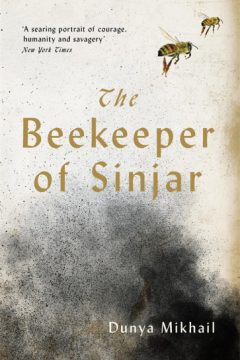The Beekeeper of Sinjar

Longlisted for the National Book Award for Translated Literature 2018
Longlisted for the PEN/John Kenneth Galbraith Prize for Non Fiction, PEN America Literary Awards 2019
From award-winning poet and journalist Dunya Mikhail, this remarkable book turns the efforts of an unlikely hero into a much larger story about the human cost of war and the persistence of courage in the bleakest circumstances.
Until 2014, Abdullah Shrem made his living as a beekeeper, selling wild honey across the mountainous Iraqi region of Sinjar. But when ISIS began systematically terrorising local Yazidi communities, and selling young women into slavery, Abdullah turned his knowledge of the local terrain to a more dangerous use. Cooperating with a secret network of helpers, he smuggled women through the war-torn landscapes of Iraq, Syria and Eastern Turkey and back to safety, one by one.
In this powerful testament of courage in the face of terror, Dunya Mikhail tells the harrowing stories of these brave women and the man who refused to accept their fate. The Beekeeper of Sinjar is a profoundly moving account of ordinary people going to extraordinary lengths to save the lives of others.
Praise for The Beekeeper of Sinjar
‘Rare and powerful… Mikhail has created a searing portrait of courage, humanity and savagery, told in a mosaic of voices. … [her] gifts as a poet infuse these narratives with unexpected beauty.’ – New York Times
‘This book makes a sound, and it should be a loud one. It is not for the faint-hearted, but they should read it anyway. We should all read it, if only to bear witness to an atrocity that happened on our watch, and that we cannot simply sweep away as concerning a faraway people of whose faith we know little.’ – Peter Stanford, The Observer
‘Remarkable … With this short book, the tragedies and the heroism of this time of horror will survive intact.’ – Louise Callaghan, The Sunday Times
‘His story is worthy of being made into a film, his resourcefulness and everyman heroism carrying shades of Oskar Schindler…[Mikahil] attempts to rehumanise a war that has been reported on so often from an aerial, abstracted viewpoint. She takes us back to the ground – to all the terrible, fragile, human detail, so that its victims and survivors can be seen as they are, made painfully of flesh and blood.’ – Arifa Akbar, The Guardian
‘Mikhail bears witness to women in war-torn Iraq, women who have scarcely known peace throughout their lives. That she is a poet is clear on each page.’ – Kirkus

